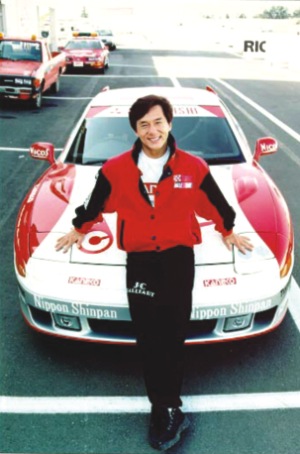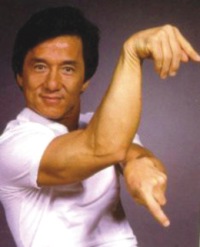|
Cinema
All
Action Globetrotting
THOMAS
SOTINEL
 The
pleasure of interviewing the Hong Kong film star Jackie Chan
begins before you meet him. It is provided by the wide-eyed
reaction of your children when you tell them you are going
to interview him. At the age of 50, Chan enjoys a popularity
that straddles continents and generations. Children see him
as a cartoon character, while film buffs remember that he
used to be a stuntman in Bruce Lee movies and was one of the
architects of the renaissance of Hong Kong action films after
Lee's death. Ordinary filmgoers will have seen him cavorting
on top of skyscrapers, leaping from lorry to lorry at breakneck
speed and shaking off hordes of killers hot on his heels in
one of the Hollywood productions that have confirmed his world-star
status over the past seven years. The
pleasure of interviewing the Hong Kong film star Jackie Chan
begins before you meet him. It is provided by the wide-eyed
reaction of your children when you tell them you are going
to interview him. At the age of 50, Chan enjoys a popularity
that straddles continents and generations. Children see him
as a cartoon character, while film buffs remember that he
used to be a stuntman in Bruce Lee movies and was one of the
architects of the renaissance of Hong Kong action films after
Lee's death. Ordinary filmgoers will have seen him cavorting
on top of skyscrapers, leaping from lorry to lorry at breakneck
speed and shaking off hordes of killers hot on his heels in
one of the Hollywood productions that have confirmed his world-star
status over the past seven years.
Chan
was recently in Paris promotin the remake of Jules Verne's
classic Around the World in 80 Days in which he appears
as Passepartout, the part that in the 1956 version was played
by the Mexican actor Cantinflas, whose image in Latin-America
was similar to Chan's today in the far east.
Chan
saw the earlier film of the novel when he was still a boy
learning singing, acrobatics, dance and martial arts at the
China Drama Academy. Born of
parents
who were so poor that they thought of having him adopted,
he spent the rest of his childhood at that school, after his
family moved to Australia. Today Chan is a firm believer in
family entertainment: "I wanted to make a movie for families
all over the world - not just for the British or the Americans,
but for everyone. One shouldn't be afraid of travelling. One
should show children the world."
The
world as seen in this version of Around the World in 80
Days is not quite the same as Verne's. In the film Berlin
plays the role Paris did in the book. But when the Chinese
countryside is shown, it is genuine: "I'll always be
Chinese," Chan says with a heavy accent. "Directors
know very well they can't get me to play an ABC [American-born
Chinese]." This explains the presence, in the middle
of this very free adaptation of Verne's novel, of a martial
arts mini-movie.
As
he has done ever since becoming a fully integrated Hollywood
figure, Chan took control of that episode: "I chose the
village, the actors and the extras, and I coordinated the
fight scenes." He got Sammo Hung, a fellow student at
the China Drama Academy, to play Wong Fei-hung, a character
taken from the great classics of Hong Kong cinema who pops
up in a Verne story. Chan's co-producers of the movie had
little choice but to agree.
It
took Chan two tries before he became successful in Hollywood.
He was already a huge star in Asia when he had his first go
in the 1980s: "It didn't work, because the older directors
wouldn't listen to me. To be quite frank, they were directing
the movie, but they had no idea about how to shoot action
sequences. Now everyone has learnt the Hong Kong style, but
at the time no one listened to me. So I said: 'Goodbye Hollywood.'
"
"Then
a new generation came along, people such as Brett Ratner [director
of Rush Hour] and Frank Coraci [Around the World
in 80 Days], who never say 'I know everything, there's
nothing you can teach me'."
Chan
has considerable experience of film-making. His theatrical
training enabled him to get a job at the Hong Kong studios
in their heyday. His extraordinary physical abilities made
him a natural stuntman. He appeared in two Lee movies, Fist
of Fury and Enter the Dragon. "I was a poor stuntman.
I earned less than $10 a day. When I saw Lee, I said to myself
that perhaps I could be like him one day."
It
was not until 1978 and Drunken Master, directed by
Woo Ping-yuen (who coordinated the fight scenes of Kill
Bill ), that Chan became a screen icon - as someone who
combined slapstick with violence, elegance with ridicule.
He was likened to the great comic stuntmen of silent cinema,
Harold Lloyd and Buster Keaton.
 He
has broken most of the bones in his body, but that has not
made him any more cautious: "Safety comes first in Hollywood,
but after so many years in the business I'm trusted by the
insurance companies - they know I'm crazy, but not stupid." He
has broken most of the bones in his body, but that has not
made him any more cautious: "Safety comes first in Hollywood,
but after so many years in the business I'm trusted by the
insurance companies - they know I'm crazy, but not stupid."
The
toll taken by his fractures has now been compounded by the
passing years: "I choreograph my fights. I know how high
I can jump. I know I can't kick in the air the way I used
to 20 years ago. So when, for example, there's a table between
me and my opponent, instead of leaping over it I pause for
a moment, then shove the table forwards. But I'm still pretty
nifty."
Chan
is a nifty businessman too. He has launched two lines of clothes
and set up a film company, Jackie Chan Empire. He has just
shot New Police Story, a sequel to one of his biggest
successes, Police Story, and produced a comedy in
Singapore. Chan would now like to go over to more dramatic
roles: "I talked to the director Ang Lee about that,
but at the time he was preparing Crouching Tiger, Hidden
Dragon . I also almost got a part in a Zhang Yimou film
- but he said he wanted to shoot an action movie, just as
I was thinking of taking up dramatic parts."
If
there is one topic that Chan likes to talk about, it is the
return of Hong Kong to China and its benefits. He adopted
such a forthright public stance on the issue that China's
main television channel, CCTV, named him as the "inspirational
person" of the year for his "patriotic passion".
Chan describes Beijing's influence on the Hong Kong cinema
as follows: "They let us do what we want, but if the
movie is too violent or too sexy it won't get released in
China. And as it's well known that China is a huge market,
we automatically cut out the violence and the sex - which
is a good thing, as there's too much violence. It's getting
worse and worse. China wants to prove that it can do better
than the British, and there's more and more freedom in Hong
Kong. But freedom has made people selfish."
Source: The Guardian
Copyright
(R) thedailystar.net 2004
| 